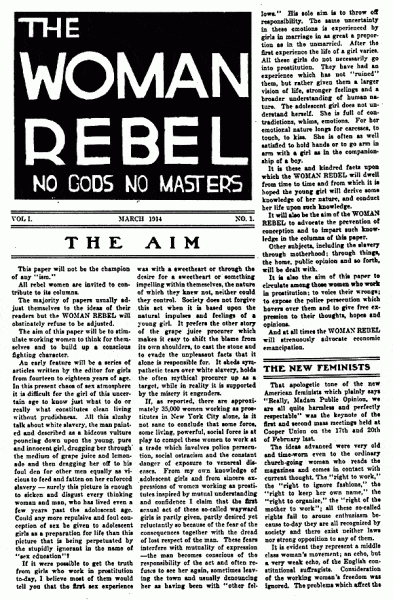/shethepeople/media/media_files/Xv3OV0KO3ErQ64mc3JAd.jpg)
Image Credit - Getty Images
Margaret Sanger, a visionary ahead of her time, dedicated her life to advocating for women's reproductive rights and reshaping the outlook of birth control. Born in 1879, amidst an era dominated by stringent Comstock laws criminalising contraceptives, Sanger shone bright as an inspiration for women seeking autonomy over their bodies and fertility.
Sanger's journey into the world of reproductive rights was not merely a professional pursuit but stemmed from profound personal tragedy. Growing up in a large Irish Catholic family, she witnessed her mother succumb to tuberculosis at a young age, a fate she attributed to the toll of bearing eleven children and enduring seven miscarriages. Confronting her father at her mother's funeral, Sanger's resolve solidified as she declared, "You caused this. mother is dead from having too many children.
The Genesis Of A Rebel
Born on September 14, 1879, Margaret Sanger's journey commenced at a time when discussions about reproductive rights were relegated to the fringes of society. Yet, fueled by a fervent desire for change, Sanger embarked on a path that would redefine the contours of women's liberation. Fueled by her anguish and a determination to prevent similar suffering, Sanger embarked on a mission to revolutionize contraception.
As a visiting nurse in New York City's impoverished neighbourhoods, she witnessed firsthand the harrowing consequences of inadequate birth control methods. Women, devoid of viable options, resorted to dangerous back-alley abortions, perpetuating a cycle of despair and danger.
The Birth Control Crusade
In 1914, Sanger introduced the term "birth control," marking a pivotal moment in her advocacy campaign. Undaunted by legal hurdles, she challenged Comstock laws, which criminalized the distribution of birth control information, by providing contraceptive resources and information, despite facing indictments and arrests in her passionate pursuit.
Sanger's activism goes beyond mere rhetoric; it manifested in tangible actions that catalyzed seismic shifts in societal attitudes. Undeterred by the prevailing societal taboos and legal impediments, Sanger boldly opened the first birth control clinic in the United States in 1916. Located in Brooklyn, New York, this humble establishment symbolized defiance in the face of oppression and provided a sanctuary for women seeking control over their reproductive destinies
Despite all these challenges, Sanger persevered, founding the American Birth Control League in 1921, and laying the groundwork for the Planned Parenthood Federation.
Being the master of the written word, Margaret Sanger wielded her pen as a potent instrument of change. As a prolific writer and lecturer, she galvanized support for the cause, elucidating the imperative of reproductive autonomy with eloquence and conviction.

Sanger's publications, including the seminal periodical "The Woman Rebel," served as a movement for a generation of women yearning for liberation from the shackles of reproductive oppression. Through her writings, she not only educated but also emboldened women to assert their inherent right to control their bodies and destinies.
The 'Magic Pill'
By the 1950s, Sanger's relentless dedication had ushered in significant legal victories, yet she remained unsatisfied. Recognizing the pressing need for accessible and effective contraception, she envisioned a revolutionary solution: the contraceptive pill. Driven by concerns about unchecked population growth and environmental sustainability and fueled by her vision of a "magic pill" that could revolutionize contraception, Sanger embarked on a quest for innovation, enlisting the expertise of medical mavericks like Gregory Pincus and the patronage of Katharine McCormick, to develop the first oral contraceptive, Enovid.
This groundbreaking achievement marked a watershed moment in the history of reproductive rights, heralding a new era of empowerment for women worldwide. In 1960, Sanger's determination bore fruit with the FDA's approval of Enovid, the world's first oral contraceptive. With the advent of the Pill, women were finally endowed with a safe, effective, and female-controlled method of contraception, heralding a new era of reproductive freedom. Sanger's dream of empowering women to take charge of their bodies had become a tangible reality.
Margaret Sanger's legacy resonates powerfully in today's world, where the United States stands at a crossroads regarding abortion rights and the equality of women's autonomy. As debates rage on, Sanger's pioneering efforts serve as a guiding light for women seeking control over their bodies and futures. Her tireless advocacy and firm commitment to reproductive rights have left a lasting mark on history that goes beyond generations and inspires a legacy of empowerment and social change.
/shethepeople/media/agency_attachments/2024/11/11/2024-11-11t082606806z-shethepeople-black-logo-2000-x-2000-px-1.png)
 Follow Us
Follow Us